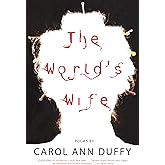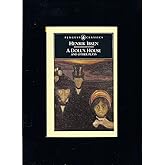Buy new:
$92.72$92.72
FREE delivery 20 - 23 May
Dispatched from: SonicBW Sold by: SonicBW
Save with Used - Very Good
$37.61$37.61
FREE delivery 9 - 19 May
Dispatched from: reuseaworld Sold by: reuseaworld

Download the free Kindle app and start reading Kindle books instantly on your smartphone, tablet or computer—no Kindle device required.
Read instantly on your browser with Kindle for Web.
Using your mobile phone camera, scan the code below and download the Kindle app.



 Audible sample
Audible sample Doll's House: Methuen Student Editi Paperback – Student Edition, 1 December 2008
Purchase options and add-ons
A revised student edition of classic set text- A Doll's House (1879), is a masterpiece of theatrical craft which, for the first time portrayed the tragic hypocrisy of Victorian middle class marriage on stage. The play ushered in a new social era and exploded like a bomb into contemporary life.
Meyer's translations of Ibsen are a major fact in one's general sense of post-war drama. Their vital pace, their unforced insistence on the poetic centre of Ibsen's genius, have beaten academic versions from the field (George Steiner).
- ISBN-101408106027
- ISBN-13978-1408106020
- Edition1st
- PublisherMETHUEN DRAMA UK
- Publication date1 December 2008
- LanguageEnglish
- Dimensions12.78 x 1.12 x 20.09 cm
- Print length176 pages
Frequently bought together

Customers who viewed this item also viewed
Product description
Review
Book Description
About the Author
Product details
- Publisher : METHUEN DRAMA UK; 1st edition (1 December 2008)
- Language : English
- Paperback : 176 pages
- ISBN-10 : 1408106027
- ISBN-13 : 978-1408106020
- Dimensions : 12.78 x 1.12 x 20.09 cm
- Best Sellers Rank: 1,044,548 in Books (See Top 100 in Books)
- Customer Reviews:
About the authors

Discover more of the author’s books, see similar authors, read book recommendations and more.

Discover more of the author’s books, see similar authors, read book recommendations and more.

Discover more of the author’s books, see similar authors, read book recommendations and more.

Discover more of the author’s books, see similar authors, read book recommendations and more.

Discover more of the author’s books, see similar authors, read book recommendations and more.

Discover more of the author’s books, see similar authors, read book recommendations and more.
Customer reviews
Top reviews from Australia
Top reviews from other countries
-
 Lotte-LaleReviewed in Germany on 5 February 2016
Lotte-LaleReviewed in Germany on 5 February 20165.0 out of 5 stars A Doll's House
Verified PurchaseEin Klassiker, den ich wieder lesen wollte, und worauf ich mich freue. Einfach genial, ein Meisterstück, vielen Dank. Es lebe Ibsen.
-
 Cliente de KindleReviewed in Spain on 16 September 2017
Cliente de KindleReviewed in Spain on 16 September 20174.0 out of 5 stars Interesante en su contexto.
Verified PurchaseSupongo que hay que entender esta obra dentro de su época para valorar el cambio que supuso, y así considerarla interesante.
 ahef1963Reviewed in Canada on 6 August 2012
ahef1963Reviewed in Canada on 6 August 20125.0 out of 5 stars Individualism and Women's Rights in late-19th century Norway
Verified PurchaseHenrik Ibsen's play 'A Doll's House' was written in 1879 and shocked theatre-goers of the era. It is a drama about a woman in what may have been a typical marriage of the time. I do not pretend to be a social historian, so that is a guess. Nora is told by her husband what she can eat (no sweets), what she can spend, what she can do with her time, and how she is to comport herself in matters of dress and behaviour. It is a stifling marriage in which Nora has no freedom of choice or ability to complain of the restraints placed upon her.
Ibsen gives Nora a way out. She rejects the confines of her marriage in search of a life where she is able to make her own choices and to explore what she is capable of doing. It is a revolutionary outlook for a playright, especially one who is male and living in the late 19th century, and I can only imagine the outrage that this drama must have caused.
I was absolutely impressed by the play. It's so forward-thinking, and so open to the ideas of individualism for everyone, and of personal freedom for women. I was severely irritated by the way in which Nora's husband, Torvald Helmer, addressed his wife: he spoke to her as if she were a child he was indulging: "Is that my little lark twittering out there?", and chastised her in the way one would an unruly child. With finely-scripted dialogue, Ibsen makes it plain to the reader or theatre-goer that there is no real relationship between Nora and Torvald; that she is the inferior in this marriage.
Enlightened and enlightening; this play is so very worth reading by anyone interested in the earliest days of women's rights and the fight for individual freedoms.
A Doll's House
-
 Leila de Carvalho e GonçalvesReviewed in Brazil on 24 January 2017
Leila de Carvalho e GonçalvesReviewed in Brazil on 24 January 20175.0 out of 5 stars Apologia Feminista
Verified PurchaseEscrita no século XIX e tendo como cenário a Noruega durante a época do Natal, a peça teatral "A Doll's House", de Henrik Ibsen (1828-1906), apresenta o esfacelamento de um casamento, contrariando a moralidade da época. Curiosamente, ela não foi escrita em versos, mas em prosa, uma linguagem geralmente reservada para as comédias.
Motivo de acaloradas discussões, a culpada de tamanho barulho é Nora, a protagonista, que abandonou o marido e os filhos para viver a própria vida. Essa decisão em apenas cem páginas ou três atos, revela o talento do dramaturgo cuja obra é considerada um "clássico da modernidade".
Seu enredo foi inspirado num fato real: a escritora e amiga de Ibsen, Laura Kieler, envolveu-se numa situação semelhante. Por sinal, Ibsen confessou ter escrito dois desfechos e num deles, contratando sua preferência, Nora permanece casada. Seu objetivo foi tornar a peça menos controversa e mais lucrativa, autorizando a encenação ou publicação, caso fosse indispensável, pois preferia cometer essa violência do que deixá-la a cargo de um outro autor sem seu gabarito.
Para finalizar, "A Doll's House" é considerada uma apologia feminista, ao abordar a submissão da mulher, tratada como uma boneca no ambiente doméstico, mas capaz de reagir a opressão e falta de liberdade, mesmo que isso acarrete a renúncia aos filhos. Sem dúvida, esse é um texto audacioso, inteligente e que merece atenção.
 Top O' TrawdenReviewed in the United Kingdom on 28 February 2014
Top O' TrawdenReviewed in the United Kingdom on 28 February 20145.0 out of 5 stars A different viewpoint about Torvald( Students take note!)
Verified PurchaseIn writing this review my aim is to demonstrate that Torvald has been, in my opinion, the recipient of much harsh criticism. At the risk of sounding chauvinistic I would like to demonstrate that he is in fact a misunderstood man who deserves both our pity and sympathy. Indeed,the more we are with him the more we realise that he presents a classic case of a person with a serious neurosis. All the evidence would seem to be pointing towards a personality Freud would have considered as obsessional; a condition he thought likely to occur in dedicated and successful people.
His persona has all the attributes of a man with Obsessive Compulsive Disorder. He is intelligent; a workaholic' scrupulously honest and obsessed by the need for order and probity both in the home and in society, Indeed he feels that without these virtues society is on the edge of an abyss.
As the play proceeds we become increasingly aware of his obsessive attitudes to thrift and honesty. Let us not forget that he was formerly a lawyer and is now a bank manager with a position in society. Also like many other men of his time he feels the need as paterfamilias to be in control of his household and the domestic economy. His role is of course is one that is re-enforced by society through its laws and customs
If further proof were needed of Torvald's neurosis we learn in a disclosure from Nora to Mrs. Linde that the doctors had informed that her husband needed a complete break. He was suffering they said from nervous exhaustion brought on by overwork and his own impossibly high standards
At the denouement of this play we can now understand Torvalds's state of mind, His abhorrence at being obliged to a man he considers to be an unscrupulous, unethical rogue. Also his bitter disappointment with Nora for committing the unspeakable act of forgery. Sadly, the world as he knew it seemed meaningless; his reputation in tatters.
The final moments of the play are poignant. For once Nora takes the initiative. She tells Torvald that it would take a miracle to save their relationship and that she no longer believed in them. She leaves, abandoning both him and her her children. In the dying moments of the play Torvald looks around him The stage directions say that hope flashes across his face.. Ibsen's use of the word flashes is interesting; suggesting a momentary illumination The door slams The illumination is extinguished.Hope dies.
This indeed is not Nora's triumphal moment. We are witnessing a tragedy affecting two lives
















